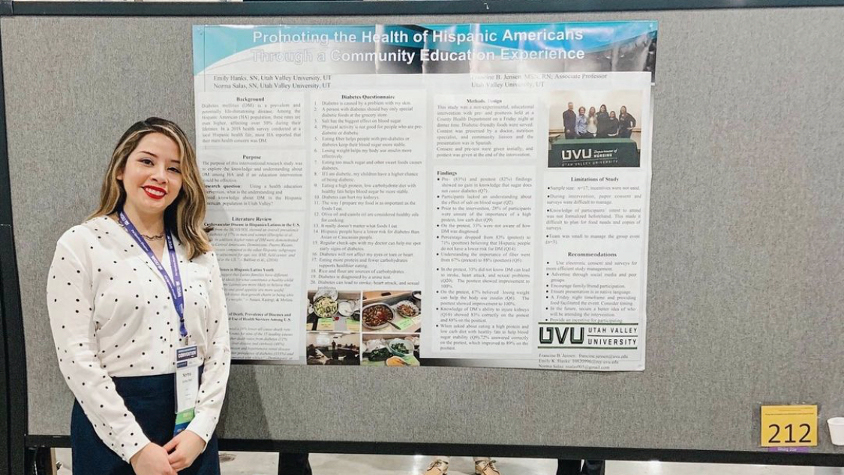Norma Salas's passion is improving the health of Spanish-speaking individuals who may not have access to the care they need.

For Norma Salas, a Utah Valley University senior studying nursing, undergraduate research is personal. Her passion is improving the health of Spanish-speaking individuals who may not have access to the care they need.
“I was born in Lima, Peru, but when I was 6 years old my family and I immigrated here to Utah and have now been living here for 20 years,” Salas says. “Growing up, I remember having to go with my parents to their doctor appointments to help translate when there was no one there who spoke Spanish. As I got older I realized we need more health education workshops, especially here in Utah County, to help increase awareness for this growing community.”
Salas and her friend Emily Gardner were in their third semester of nursing school when they began excitedly discussing future research opportunities. They decided to create their own. Apart from any class or assignment, they contacted Professor Francine Jensen. Professor Jensen became their mentor and helped their project thrive.
Salas had completed an internship with the Wasatch County Health Department, where she assisted with diabetes education workshops. That experience taught her the importance of providing information in both English and Spanish. “It allows more people to get the information they need to feel in control of their health. I realized that more still needs to be done in order to provide Hispanic people in our community with opportunities to focus on prevention of chronic diseases,” she said.
Her experience led to the research she and Gardner would conduct in Utah County.
“I was curious if adult Hispanic diabetics in Utah County faced similar challenges. Our research design included a pre-test, a personalized educational intervention on diabetes management in Spanish provided by an interdisciplinary healthcare team, and a post-test to assess their understanding of diabetes and the impact a program like this could have to help influence a better quality of life.”
By offering the two tests, the researchers were able to measure the effectiveness of the workshop they held and find areas that needed improvement. Overall, they were pleased with the results.
“The results in our study showed an increase of understanding in the following topics: purchasing diabetic-friendly foods; weight control; eating a high protein and low carb diet with fiber; the impacts of diabetes on the kidneys, the eyes, and the overall sexual function of the patient; the importance of regular checkups; strokes and other complications caused by diabetes; and understanding risks for children whose parents are diabetic,” Salas says.
Salas and Gardner now have more opportunities to troubleshoot the workshop itself and learn how to teach community members more effectively. She says being a part of the nursing program at UVU gives her the opportunity to make a real and lasting difference in people’s lives.
“Because of my immigrant background and life experiences, from the very beginning of nursing school I always reminded myself that I am here because I want to be able to become the best nurse I can be, so that I can help as many people as possible — especially the Hispanic community,” she says.
“Hispanics are at higher risk of being diagnosed with chronic diseases like diabetes mellitus compared to non-Hispanics. Early on in nursing school I tried to find opportunities to help minorities in my community, and overall I’d say that this research experience was one way my team and I were able to do just that.”